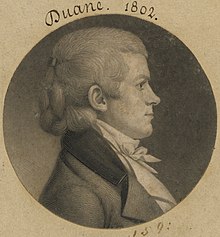William Duane | |
|---|---|
 | |
| Born | 12 May 1760 |
| Died | 24 November 1835 (aged 75) Philadelphia, Pennsylvania, U.S. |
| Resting place | Laurel Hill Cemetery, Philadelphia, Pennsylvania, U.S. |
| Occupation(s) | journalist, newspaper publisher, author |
| Political party | Democratic-Republican |
| Movement | London Corresponding Society, American Society of United Irishmen |
William Duane (12 May 1760 – 24 November 1835) was an American journalist, publisher, author and activist of Irish descent who was active on four continents.
After working for radical Whig newspapers in Ireland and in London, he managed two titles of his own in the Bengal Presidency. Both were closed down for seditious content and in 1794 he was deported by order of the Governor General. Back in London, he edited The Telegraph as an active member of the city's federation of democratic clubs, the London Corresponding Society. In advance of the society's suppression, in 1796 he returned to North America which he had first left as a child.
As editor of the Philadelphia Aurora, Duane became a leading publicist for Thomas Jefferson's Democratic-Republican opposition as well as for a community United Irish émigrés with whom he protested the Alien and Sedition Acts. In response, the Federalist press accused Duane of advancing principles of interracial democracy in a conspiracy with the French to divide the American Union. Duane, however, failed to maintain an abolitionist stance when, in the War of 1812, British forces pursued a policy of recruiting fugitive American slaves.
Finding limited favour with the Jefferson administration in Washington, Duane split the Democratic-Republican coalition in Pennsylvania by pressing reforms to hold the state judiciary and state legislature to greater popular account. In his later years, Duane joined war hero Andrew Jackson and the Democratic Party in their opposition to concentrating control of public credit in a central bank. He also travelled in and reported from, South America where he was recognised by his hosts for his support in their wars of independence.